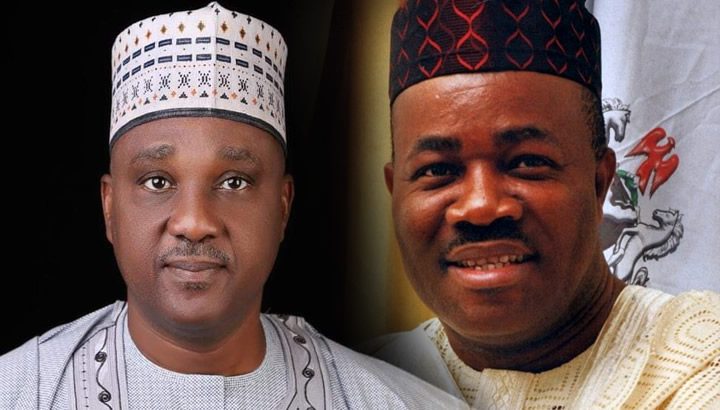Breaking News
How Lawmakers are sucking Nigeria dry
To gain further insights into this matter, prominent lawyers, statesmen, activists, religious leaders, and community leaders have expressed their opinions on whether Nigeria would benefit economically from a unicameral legislature instead of a bicameral one.

This is scandalous. It is nothing but sheer insensitivity that as Nigerians are groaning under the weight of the current economic realities, a presiding officer of the National Assembly could appoint 400 aides to himself alone who are being paid for virtually doing nothing by the Nigerian tax payers.
The number of aides to be engaged by Presiding Officers in the nation’s National Assembly is open ended as the President of the Senate and the Deputy Senate President can each engage over three hundred persons. Each federal lawmaker is entitled to five aides who are paid by the National Assembly Service Commission. But the number of aides to be engaged by Presiding Officers is left to their discretion, which invariably is exploited by those who want to use the office , appointing aides for political reasons especially in election years.
A source told Vanguard that in the just concluded 9th Senate under the leadership of Senator Ahmad Lawan, the two presiding officers, the eight Principal Officers and other Senators engaged more than 4, 000 aides put together. The Presiding officers of the Senate are the President of the Senate and his Deputy, while the Principal officers are the Majority leader; the Chief Whip; the Deputy Majority Leader; and the Deputy Majority Whip. Others are the Minority Leader; Minority Whip; Deputy Minority Leader and Deputy Minority Whip.
These officers are entitled to appoint aides to be paid by the Management of the National Assembly and the National Assembly Service Commission as they get up to 10 slots from Management and five to be paid by the Commission. Other Senators who are not Principal Officers are entitled to five aides who are paid by the Commission, but they can get other staff to be paid from their pockets.
Vanguard gathered that in the 6th and 7th Senate when Senator David Mark was the President of the Senate, he had about 350 aides who were here in Abuja as well as in his Makurdi and Otukpo offices in Benue state. David Mark was the President of the Senate from 2007 to 2015.
According to another source, during Senator Bukola Saraki’s tenure as the President of the Senate from 2015 to 2019, he enjoyed the services of close to 380 aides, but he later reduced their allowances.
As the President of the Senate from 2019 to 2023, Senator Ahmad Lawan had almost 400 aides and they were mostly in Yobe state, especially his Senatorial District of Yobe North.
A source said, “In the just concluded 9th Senate, the immediate past Deputy Senate President, Senator Ovie Omo- Agege had close to 500 aides because of his governorship. Appointment of aides by the Presiding Officers is an open-ended thing. Omo- Agege and the former Speaker, House of Representatives, Femi Gbajiabiamila took advantage of it and had many aides as well as Lawan and Omo- Agege. Even up till January and February this year and less than four months to the end of their tenure, letters were still being given out on the appointment of aides. The Presiding Officers of the present 10th Senate have from now till January 2027 to issue such letters.”
In a country grappling with economic challenges, the National Assembly’s recent allocation of N70bn for its members as palliative for the withdrawal of oil subsidy and N45bn for the purchase of cars for its members has sparked concerns about the cost of governance. These figures, coupled with the lawmakers’ exorbitant pay packages, have led to concerns about the sustainability and fairness of such expenditures. With a reputation for bestowing generous allowances upon themselves, lawmakers in Nigeria enjoy one of the highest pay packages in the world. In Nigeria’s political landscape, it has become customary for lawmakers to allocate substantial allowances to themselves, irrespective of the state of the economy.
Furthermore, the public is disheartened by the apparent disconnect between the lawmakers and the ordinary citizens they represent. While many Nigerians struggle to make ends meet, the indulgence of the National Assembly in allocating funds for luxury items and personal benefits strikes a chord of discontent. This growing disparity in wealth and priorities begs the question of whether the bicameral legislature truly serves the best interests of the Nigerian people.
Costly National Assembly
Critics argue that maintaining this dual system comes at a significant cost to the nation. The duplication of efforts, administrative expenses, and the need for separate offices and staff for both chambers all contribute to the hefty price tag of governance. Moreover, the efficiency and effectiveness of decision-making processes within the bicameral system have been called into question.
Some argue that the legislative process is often slowed down due to the need for harmonization between the two chambers, resulting in delays in passing critical legislation. This sluggishness can hinder progress and impede the government’s ability to address pressing issues promptly.
To gain further insights into this matter, prominent lawyers, statesmen, activists, religious leaders, and community leaders have expressed their opinions on whether Nigeria would benefit economically from a unicameral legislature instead of a bicameral one.









